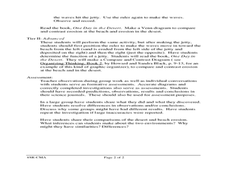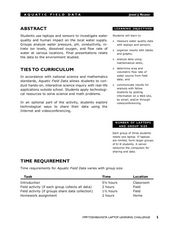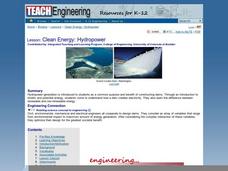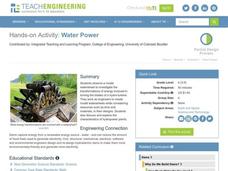Curated OER
Alternative Energy Sources
Students recognize that people have various opinions on the use of renewable energy.In this renewable energy lesson, students research to find the best uses of renewable energy. Students create an original design for a group...
Curated OER
Water Pollution
Students explore the causes of water pollution. In this environmental instructional activity, students conduct experiments with natural filtration systems.
Curated OER
Not A Drop To Drink
Fifth graders discuss ways that humans pollute our natural water supply. They observe a video about water pollution. Students identify eight different ways water is contaminated. They investigate an oil spill by conducting a hands-on...
Curated OER
Wetland Habitats
Eighth graders explore the program Alice and the Internet to research wetland habitats. In this habitat lesson students build their own Alice world that includes wetland habitats, food sources and ways to protect the habitats.
Curated OER
Florida's Springs
Students illustrate how water is stored and the water cycle. They discover how underground water can become contaminated.
Curated OER
Water Contamination Mapping Lab
Students are introduced briefly to the Biscayne Bay Ecosystem, observed microbe distributions and water current maps are introduced. They measure water current speeds to predict the movement of pollutants based on the type of the tidal...
Curated OER
Water in the Environment
In this water in the environment instructional activity, students match 10 terms related to water to their definitions. They identify 10 sentences as true or false related to groundwater, layering and landfills. They fill in the blanks...
Curated OER
The Physical Environment
Fourth graders use damp sand, a baking pan, and water to simulate erosion. In this erosion lesson plan, 4th graders participate in a simulation to show what moving water does to land.
Curated OER
Be a Watershed - Create a Living River
Students investigate water ways by conducting an experiment with classmates. In this natural resources lesson, students define a watershed and identify where large ones are located within the United States. Students utilize cups,...
Curated OER
Energize Your Future
Students consider the positive and negative aspects of alternative energy. In this physical science lesson plan, students consider the sources of energy they use everyday. Students compare alternative sources of energy and complete a...
Curated OER
A Limnology Study of Drainage Ditches
Students chemically test water, observe microscopic organisms in the classroom, and screen the sample for macroinvertebrates. They design a reporting sheet that list all the items to be tested and a space to record the results.
Curated OER
Aquatic Field Data
Students use laptops and sensors to measure water quality and graph their results. In this aquatics lesson students post their results to a website or email.
Curated OER
From the Source to the Sea: The Nisqually River Watershed
Students research the conflicts over different uses of the Nisqually River resources and role play as mediators between Chief Leschi and other interested parties. They cite and interpret relevant artifacts and primary and secondary...
Curated OER
Clean Energy: Hydro-power
Students read about and discuss renewable and non renewable energy and identify how a dam produced energy using hydro-power. In this water energy lesson plan, students look at diagrams and pictures of water energy technology.
Curated OER
Nuclear Energy
Atomic theory as a philosophical study was explored even by the Ancient Greeks. The knowledge of atoms was developed in the 17th century. This PowerPoint explains how by the 1940's, splitting of the atom was discovered and since then,...
Teach Engineering
Water Power
Young hydrologists observe a waterwheel which helps them investigate the transformations of energy that occur when the blades of a hydro-turbine are turning. They work together in pairs and pretend to be engineers who are building a new...
Channel Islands Film
Dark Water: Lesson Plan 1 - Grades 3-4
As part of their study of the history of the Channel Islands, class members craft an informational article to post on a bulletin board that features the Chumash ancestral tradition of tomol paddling.
Teach Engineering
Photosynthesis—Life's Primary Energy Source
Wouldn't it be great if you could produce your own food? Scholars learn about the processes of photosynthesis and cellular respiration in plants. They consider how to use photosynthesis as a model of an efficient system and how to apply...
Curated OER
Lesson 4: Fire, Rock, and Water
You can demonstrate the destructive force of volcanic mudflows to your early earth scientists using this lesson plan. Messy, but memorable, the two demonstrations require some preparation. Use one or both! Included is a link to activity...
PHET
Wave Interference
Why did the waves get into a fight? They were tired of each other's interference. Scholars observe the wave patterns from dripping water, sound waves, and light waves. They vary the spacing, build barriers, and increase the number of...
Curated OER
BioFuels: The Chemistry and Economics of Alternative Fuels
Junior chemists manufacture biodiesel in the lab. For this exercise, they check the purity of the biodiesel using thin layer chromatography. They also calculate its density and heat of combustion. They are sure to rise to the challenge...
NOAA
Calling All Explorers
Let's get moving! The second installment of a 2-part series of six adventures helps learners take part in individual explorations by sea and by land. After navigating the waters in an informative WebQuest, groups create and hide their...
Curated OER
Where, Oh Where, Has That Water Gone?
Students study the benefits of reservoirs while locating and identifying water sources that flow into Tuttle Creek Reservior.
Utah LessonPlans
Water, Please!
Students use a globe and cups of water to illustrated the amount of water versus land on earth and the amount of fresh versus salt water available to plants and animals.
Other popular searches
- Sources of Water Pollution
- Water Sources Grades K 2
- Water Sources K 2
- Activities on Water Sources
- Natural Water Sources
- Water Sources in Qatar
- Types of Water Sources
- Landforms Water Sources
- Sources of Water
- Streams as Water Sources
- Natural Sources of Water
- Water Sources in Drought

























